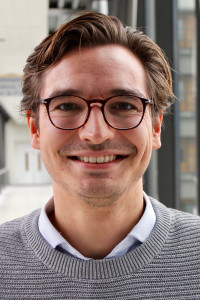PhD-student

Research:
β-Thalassemias are monogenic hematologic disorders caused by mutations in the β‐globin gene. To date, the only curative option, i.e., allogeneic hematopoietic stem cell (HSC) transplantation, includes limitations linked to the availability of Human Leukocyte Antigen (HLA)‐matched donors and the significant risks of developing graft‐versus‐host disease and graft failure. In principle, these hurdles can be overcome by autologous transplantation of genetically corrected HSCs. Given this medical need, we aim to investigate new genome editing strategies for correcting β-Thalassemia‐causing mutations in the genome of HSCs. To this end, we are currently developing adenoviral vectors encoding CRISPR/Cas9 nucleases for mediating genome editing in HSCs.
Curriculum Vitae:
After receiving my B.Sc. degree in Biology at the University of Leiden (2015), I decided to switch to the LUMC in order to join the M.Sc. program Biomedical Sciences: Research. My main motivators for this switch were the recent developments in the field of targeted genetic manipulation of human cells as a method of curing congenital diseases, i.e., gene therapy. After obtaining my M.Sc. certificate in 2017, I started my Ph.D. in the group of Prof. Dr. Rob Hoeben under supervision of Dr. Manuel Gonçalves and Dr. Ignazio Maggio at the Virus and Stem cell Biology group of the Department of Cell and Chemical Biology in the LUMC. My current research focuses on the development of adenoviral vector-based gene editing strategies of hematopoietic stem cells for the treatment of β-Thalassemia.



Looking for information on one of our topics, a new place to conduct your research or experienced research to join forces with? Feel free to contact us.!